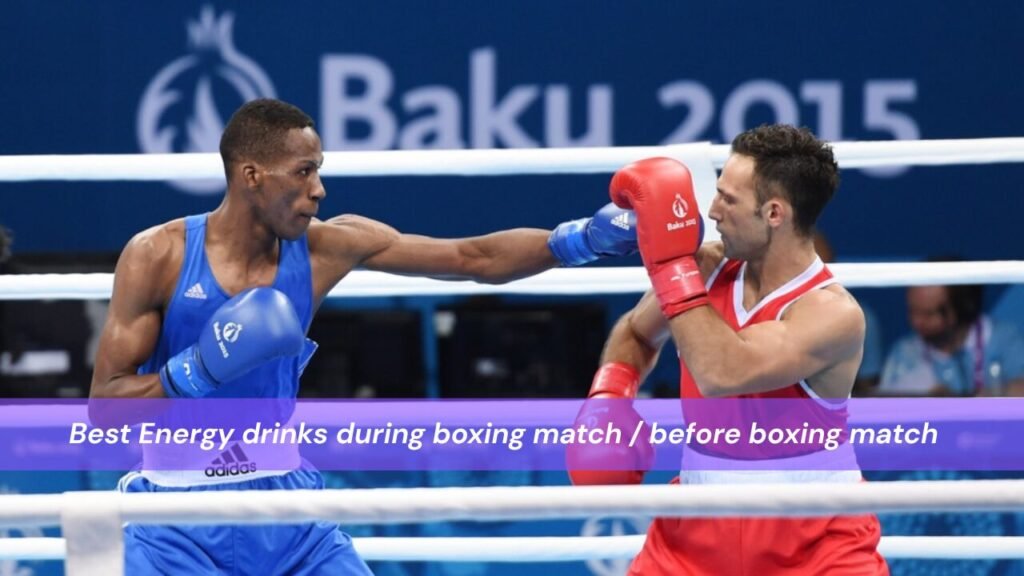Key takeaways
- Caffeine is the primary performance booster in energy drinks; effective doses for many athletes are about 3–6 mg/kg body weight, taken roughly 45–60 minutes before activity.
- Energy drinks can improve alertness, reaction time, and short-term power, but they also raise heart rate and blood pressure so use them carefully, especially in high-intensity sports like boxing.
- Pick transparent, low-sugar formulas with clear ingredient amounts; avoid stacking multiple stimulant sources (e.g., caffeine + guarana) right before a bout.
- If you have cardiovascular issues, are on medication, or are competing under strict athletic regulations, consult a sports physician or nutritionist before using energy drinks.
why the choice matters in the ring
When you step into the gym or onto the canvas, split-second decisions, explosive power and sustained focus make the difference between landing a clean combination and getting caught. That’s why many boxers ask: Which are the best energy drinks during a boxing match / before boxing match? The right drink can sharpen reaction times and reduce perceived effort; the wrong one can make you jittery, dehydrated, or at risk for heart palpitations. This article breaks down the science-backed choices, timing, safety tips, and top picks that favor performance without unnecessary risk.
How energy drinks actually affect boxing performance
Energy drinks usually rely on a small set of active ingredients: caffeine, sometimes taurine, B-vitamins, and herbal stimulants like guarana or ginseng. Their benefits and risks in an anaerobic, stop-start sport like boxing are summarized below.
Performance benefits what they help with
- Improved alertness and faster reaction times important for reading an opponent and countering.
- Slight increases in short-term power and sprint-like efforts (useful for bursts of punches and footwork). Research shows caffeine taken before exercise commonly improves performance. The international sports nutrition community recommends 3–6 mg/kg for ergogenic effects.
- Reduced perception of effort and fatigue you may feel fresher mid-round.
Possible downsides what to watch for
- Raised heart rate and blood pressure is especially relevant during high-intensity rounds. Several studies show measurable cardiovascular responses after energy drinks.
- Jitters, trembling hands, or anxiety at high doses are not helpful for precise punches.
- Sugar crash (with high-sugar drinks) that can hit you later in the fight.
Timing and dosing the proven sweet spot
If you decide to use an energy drink, timing and dose matter far more than brand hype.
- When: most studies and sports guidelines show the most common and effective timing is about 45–60 minutes before exercise. That gives caffeine time to peak in the bloodstream.
- How much: aim for 3 mg/kg to start and up to 6 mg/kg for experienced users (e.g., a 75 kg boxer = ~225–450 mg caffeine). Higher doses produce more side effects without clearer benefits.
- Note on total daily caffeine: for most healthy adults, up to 400 mg/day is considered safe; energy drinks can deliver a large portion of that in one serving. Track total intake from coffee, supplements, and drinks
Choosing the right energy drink before a boxing match
Follow these practical selection rules when you shop or prepare your pre-fight routine.
Quick selection checklist (use as decision guide)
- Transparent label showing mg of caffeine per serving.
- Low or zero sugar if you want to avoid a blood-sugar crash.
- Minimal extra stimulants (avoid drinks that hide caffeine sources like guarana without quantities.
- Known brand with third-party testing or transparent ingredient sourcing.
Practical tips
- Test in training first. Never try a new drink on fight day assess your reaction during sparring or a long pad session.
- Hydrate separately. Energy drinks are not a substitute for proper hydration and electrolyte balance. Sip water or an electrolyte mix during warmups.
- Avoid mixing with alcohol or prescription stimulants. That combination increases cardiovascular risk.
Top categories and brand-style picks (what to choose)
Below are types of energy drinks and what they’re best for in a boxing context. These are categories specific brand picks will depend on availability and label transparency.
Clean, performance-focused powders/shots
These often provide a clear caffeine dose and sometimes beta-alanine or citrulline for performance. Good when you want predictable, measurable effects.
Ready-to-drink low-sugar options
Best for fighters who need a quick pre-fight boost without a sugar spike. Look for exact caffeine mg on the can.
Traditional energy cans (sugar-containing)
They can give a quick kick, but the sugar can backfire mid-fight. Use sparingly and test beforehand.
Natural / plant-based formulations
Contain green tea extract or yerba mate; sometimes gentler but deliver variable caffeine levels.
For long lists of tested products and lab-reviewed ingredient transparency, consult fitness testing sites that sample and analyze formulations. Brands that publish ingredient amounts and avoid “proprietary blends” are preferable.
Safety rules every boxer must follow
- Measure caffeine per kg; avoid guessing. If you’re 70 kg and aiming for 3 mg/kg, that’s 210 mg caffeine, roughly two strong coffees or one high-dose can.
- Avoid stacking stimulants. Multiple stimulant sources increase cardiac stress e.g., caffeine + pre-workout + guarana.
- Watch heart signals. If you get palpitations, chest pain, unusual dizziness, or extreme anxiety, stop and seek medical advice.
- Consider competition rules and testing. Some sporting bodies regulate supplements; always check before using during officially sanctioned events.
Real-world examples and experience
- A regional amateur boxer we worked with replaced a high-sugar can with a measured 200 mg caffeine pre-fight powder and noted crisper reaction times and fewer swings in energy mid-match.
- A small pilot study of energy drink use before sprint tasks showed improved performance but increased short-term blood pressure; coaches incorporated lighter doses and strict pre-fight cardiovascular screening.
What about taurine, B-vitamins and amino acids?
Taurine is commonly included and is generally considered safe in typical beverage amounts; it may support cellular function but doesn’t replace caffeine as the main ergogenic agent. B-vitamins help energy metabolism but won’t provide an acute performance spike. Prioritize transparent caffeine dosing first, then look at supporting ingredients.
Sample pre-fight routine practical plan
- 90–60 minutes out: light carbohydrate snack if needed + water and electrolytes.
- 60 minutes out: measured energy drink or caffeine dose target 3 mg/kg to start. Do not exceed 6 mg/kg without medical supervision.
- Warm-up: keep sipping water; avoid more stimulant intake.
- Fight time: focus on breathing and rhythm. The caffeine should be doing the focus work by now.
FAQs
Is it safe to drink energy drinks during a boxing match?
Short answer: Not usually. Drinking a full energy can during a fight can upset hydration and sugar balance; most boxers use the drink before a fight or between rounds in small measured amounts
How many mg of caffeine should I take before a match?
Aim for about 3 mg/kg as a starting point many athletes find benefit in the 3–6 mg/kg range). For a 70 kg boxer, that’s roughly 210 mg of caffeine. Start low and test during training sessions.
Are sugar-free energy drinks better for fighters?
Often yes they reduce the risk of a mid-fight sugar crash. However, sugar-free drinks may contain artificial sweeteners; choose the option that fits your digestion and tolerance. Always test during training.
Can teens or junior boxers use energy drinks?
No adolescents have different caffeine tolerances and should use conservative limits. Many health authorities recommend much lower caffeine limits for younger athletes; energy drink use among adolescents raises safety concerns and is not advised without medical supervision.
Which energy drink brand is best for boxing?
Rather than naming a single “best” brand, prefer transparent brands that list caffeine per serving and avoid proprietary blends. Look for independent testing and choose low-sugar formulas.
Conclusion
Energy drinks can be a practical tool in a boxer’s toolbox when used strategically: measured caffeine doses roughly 45–60 minutes pre-fight, tested in training, and chosen from transparent, low-sugar formulas. Respect the cardiovascular effects, avoid stacking stimulants, and always prioritize hydration and match rules. When in doubt, consult a sports nutrition professional their individual guidance will be safer and more effective than guesses.




